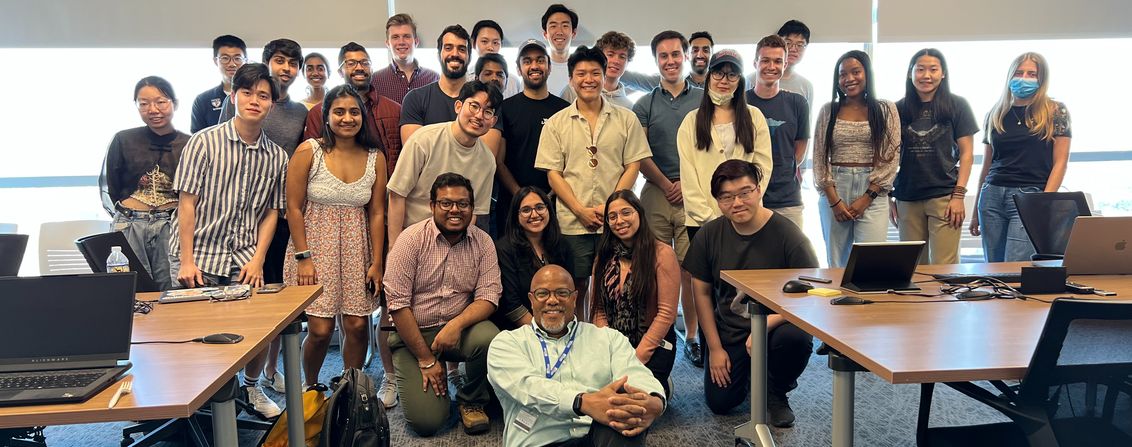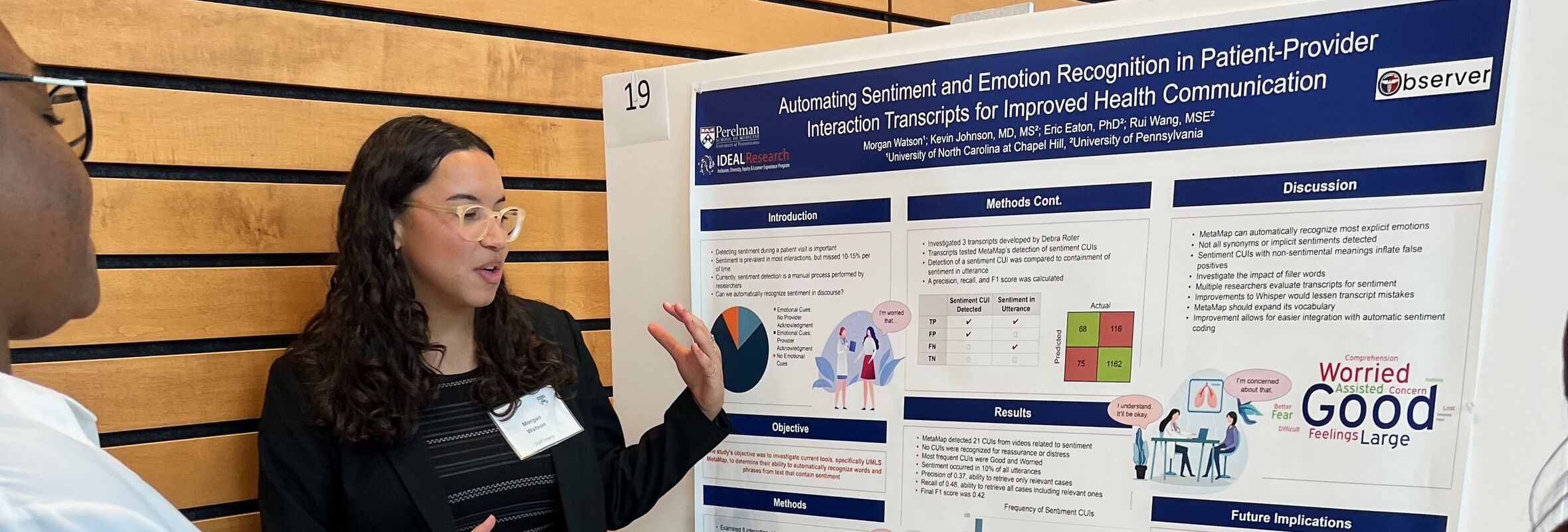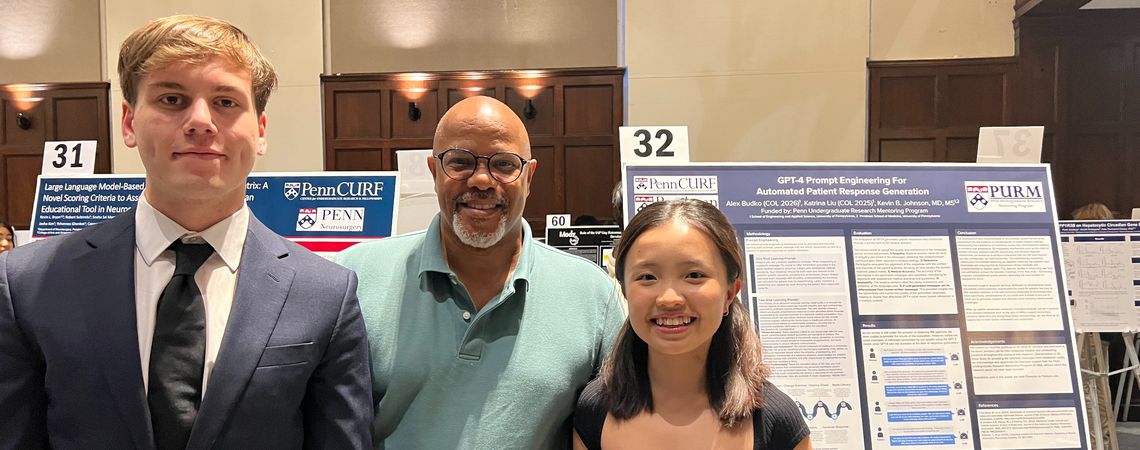Opportunities
The AI-4-AI Lab collaborates with several programs, both university-wide and nationally, to offer research opportunities to students of all ages and backgrounds who are interested in science, technology, engineering, and mathematics (STEM) subjects. Students who are BE and CIS majors with strong computational and programming skills are preferred. Python, Java, and R are also preferred. Experience with deep learning methods is desirable. Alternatively, experience with clinical research (in clinic settings) is desirable.
Dr. Kevin Johnson also guest lectures in courses throughout the Penn campus and internationally.
Courses

Professor: Dr. Kevin Johnson (jokevin@upenn.edu)
TAs:
Sameer Bhatti (sabhatti@seas.upenn.edu)
Edward Zhang (zedward@seas.upenn.edu)
Semester: Fall 2025
Time: Wednesdays 12:00-2:59 PM (8/26 to 12/8)
Overview:
CIS 7000, Section 6 (Health, Health Systems and Technology) is a seminar course that dissects the healthcare system and patient care from the lens of informatics and computer science. The course focuses on four topics:
-
- An overview of the healthcare system, including its structures, processes, and factors influencing patient outcomes.
- Current challenges and opportunities within the healthcare system today, including digital health and AI in medicine.
- The past, present, and future of health-related devices, technology, and healthcare data.
- Sociotechnical and engineered systems applied to healthcare.
Format: Each class will begin with an overview of salient points about a topic. This will typically include a talk given by a guest speaker. The talk will be followed by an activity to further expand on the talk. Students are expected to work in groups at their tables during these activities. The class will conclude with a student-led discussion of computer science or informatics papers related to that topic above. Students are expected to work in groups of 3-4 students to lead one weekly discussion related to a topic and a reference scientific paper. To make this fun, students should do the best they can to adopt the role for which they have signed up, and to answer class questions from that perspective. We expect students to dive deep into these topics and deliver an engaging presentation that involves the entire class. Students that are not presenting in a given week are expected to actively participate and engage in in-class discussions.
Intended Audience: This course is intended for PhD, Masters, and advanced undergraduate students with interests in programming systems, data science methods, artificial intelligence, or related topics that are applicable to healthcare. There are no specific course prerequisites, although students are expected to have some prior programming experience and should be able to read and interpret engineering and informatics-oriented papers.
Grading: We will emphasize exposing engineers to problems and challenges inherent in the healthcare domain that are amenable to new engineering methods. In that light, there will be no exams. Students who complete assignments on time and do a satisfactory job in their discussions, project proposal, and final project can expect an A. Grading will be influenced by participation in class. We will not use a curve, so there will be no limit to the number of students who qualify for a particular grade.
Faculty: Dr. Kevin Johnson (jokevin@upenn.edu) and Dr. George Demiris
Time: varies
Dates: September 09, 2025 - October 20, 2025
Location: online
Structure: Asynchronous with weekly live class meetings
Overview:
This fully online non-technical course is designed for professionals and graduate students to gain an understanding of the digital health landscape so they might effectively leverage technology for innovation, with consideration of patient-centered care, equity, and ethical issues. Students will explore a range of health care settings, health care data types, the role of patients as sources of data and recipients of information, the role of humans in-the-loop of AI, and the security, privacy, and confidentiality concerns of digital health approaches. There will be discussions of emerging systems still in their infancy, and enabling technologies outside of the hospital: what they can do, what they are unable to do, and which have the potential to revolutionize the way we deliver care from birth to old age.
Undergraduate Opportunities

The University of Pennsylvania Summer Undergraduate Internship Program (SUIP) is a prestigious 10-week research experience for undergraduates aiming for doctoral studies in biomedical sciences. Interns work with a Principal Investigator (PI) on research projects, gaining hands-on lab and analytical skills. The program includes scientific seminars, professional development workshops, and graduate school preparation, which will culminate in the SUIP Symposium, where interns present their research. SUIP is designed for highly motivated students—especially those with limited exposure, experience, and access to extensive research opportunities—who are eager to initiate, expand, and refine their expertise in preparation for impactful careers in biomedical research, scholarship, and discovery.
The AI-4-AI Lab is an active participant of this program. Applicants interested in joining the lab should select "Epidemiology and Biostatistics" as their graduate group of choice.
Alumni: Heran Russom (2024), Morgan Watson (2023)

Since its inception in 2007, Penn has supported undergraduate research through the Penn Undergraduate Research Mentoring Program (PURM). PURM provides students completing their first or second undergraduate year the opportunity to spend a summer conducting cutting-edge research under the guidance of a standing Penn faculty member.
Alumni: Luka Koll (2024), Elizabeth Jiang (2024), Alex Budko (2023), Katrina Liu (2023)
The Center for Undergraduate Research and Fellowships serves as the University of Pennsylvania's information hub and primary support office for Penn students and alumni considering applying for major grants and fellowships. CURF aims to demystify these opportunities to help undergraduate and graduate students and alumni determine which fellowships they wish to explore and support them through the application process.
Employment
Penn/Federal Work-Study is a federal government and Student Financial Services subsidized work program, which provides on-campus and off-campus employment to eligible undergraduate and graduate students with financial need.



